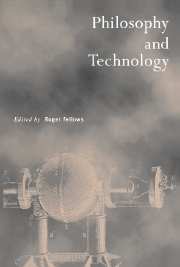Book contents
- Frontmatter
- Contents
- Introduction
- Technology: Liberation or Enslavement?
- Do the Successes of Technology Evidence the Truth of Theories
- Instrument and Reality: The Case of Terrestrial Magnetism and the Northern Lights (Aurora Borealis)
- Realism and Progress: Why Scientists should be Realists
- Quantum Technology: Where to Look for the Quantum Measurement Problem
- Welcome to Wales: Searle on the Computational Theory of Mind
- Acts, Omissions and Keeping Patients Alive in a Persistent Vegetative State
- Technology and Culture in a Developing Country
- Art and Technology: An Old Tension
- Tools, Machines and Marvels
- Values, Means and Ends
- Question Time
- Notes on Contributors
- Index of Names
Welcome to Wales: Searle on the Computational Theory of Mind
Published online by Cambridge University Press: 27 October 2009
- Frontmatter
- Contents
- Introduction
- Technology: Liberation or Enslavement?
- Do the Successes of Technology Evidence the Truth of Theories
- Instrument and Reality: The Case of Terrestrial Magnetism and the Northern Lights (Aurora Borealis)
- Realism and Progress: Why Scientists should be Realists
- Quantum Technology: Where to Look for the Quantum Measurement Problem
- Welcome to Wales: Searle on the Computational Theory of Mind
- Acts, Omissions and Keeping Patients Alive in a Persistent Vegetative State
- Technology and Culture in a Developing Country
- Art and Technology: An Old Tension
- Tools, Machines and Marvels
- Values, Means and Ends
- Question Time
- Notes on Contributors
- Index of Names
Summary
In a recent book devoted to giving an overview of cognitive science, Justin Lieber writes:
… dazzingly complex computational processes achieve our visual and linguistic understanding, but apart from a few levels of representation these are as little open to our conscious view as the multitudinous rhythm of blood flow through the countless vessels of our brain.
It is the aim of hundreds of workers in the allied fields of Cognitive Science and Artificial Intelligence to unmask these computation processes and install them in digital computers.
Professor Kevin Warwick of the University of Reading says that within fifteen years there will be machines appreciably more intelligent than any human being and, echoing John McCarthy, he foresees: ‘a machine-based intelligent environment, and we're just what we would regard as animals within that’.
The image of the computer or robot endowed with genuine mentality resonates deeply in the collective psyche of late twentieth-century Western culture, and that image often has the dark overtones hinted at by Professor Warwick and made explicit in films such as Westworld. And no wonder. The computer is the most complex technology ever devised by man, and we hold it up as a mirror to our own souls.
Information
- Type
- Chapter
- Information
- Philosophy and Technology , pp. 85 - 98Publisher: Cambridge University PressPrint publication year: 1995
